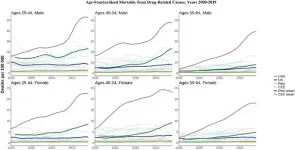(Press-News.org) The NHS needs an immediate cash injection of around £8.5bn a year over the next four years to make up a £32bn shortfall in funding and help tackle the current crisis, especially in areas such as waiting times, access to primary care, workforce and capital investment, say experts in the second report of The BMJ Commission on the Future of the NHS.
John Appleby and colleagues argue that, while the government’s recent spring budget funding pledges are a start, they “certainly will not make up the significant shortfall that the NHS now faces.”
And while it will be up to the NHS to decide the detail of how best to spend additional funds, they say “it is clear that an immediate priority should be given to investment that will sustainably reduce elective, mental health and cancer waiting times, improve access to primary care, and address the workforce and capital investment challenges that the NHS is currently facing.”
They also recommend establishing a new independent body to produce regular reports on health and healthcare, and on medium term (five to 10 years) and long term (50 years) funding projections.
The BMJ Commission brings together leading experts from medicine and healthcare to identify the key challenges and priorities and make recommendations aimed at ensuring that the vision of the NHS is realised.
Amid rising demand, rising costs, and worsening performance, the second paper asks how should we finance the NHS? How much do we want to spend? And how do we decide how much to spend?
Their first recommendation is that the current model of NHS funding, primarily through taxation, is maintained.
“This mandatory payment system avoids many of the problems associated with voluntary insurance markets,” they write. “It benefits from economies of scale in terms of administration, risk management, and purchasing power .. and avoids the inevitable disruption of moving to a new model.”
They also suggest that NHS performance should be monitored by a new independent body, the Office for NHS Policy and Budgetary Responsibility (OPBR), the concept for which was outlined in the first BMJ Commission report to hold government to account for delivery of NHS plans and policies.
Drawing on existing work from other organisations, they explain that it would produce an annual report on the performance of the NHS, including population health outcomes, access, and waiting lists, plus patient and public satisfaction and an analysis of expenditure.
Every five years, ahead of a general election, it should also produce a report on the future of healthcare in the following 10 years, and a very long term indicative view (over the next 50 years) of spending pressures based on known drivers of such pressures.
Governments should be required to respond to the report within six months of taking office, in consultation with professionals and the public, they add. This would result in a five year strategic plan for the NHS with a detailed five year financial settlement, and a provisional settlement over the five to 10 year horizon.
Finally, they call for an immediate cash injection to start to recover a £32bn shortfall in funding over the decade to 2020 and to help to tackle the current NHS crisis, especially the surgery backlog and access to primary care, as well as addressing workforce challenges and funding for delayed capital projects (estimated to be £10.2bn in England in 2022).
They acknowledge that catching up on this shortfall in revenue and capital spending would, realistically, take time. But say a start could be made with a real increase of 4% for 2024/25, equivalent to around £8.5bn at 2022-23 prices, with similar increases over the subsequent four years.
Given current economic conditions and financial pressures across public services in general, no easy short term fixes to public finances are available, they write. “Future governments will need to grapple with difficult decisions, including the probability of raising more money from general taxation.”
However, following these recommendations “would ensure the stability of the NHS funding model, with ongoing independent analyses of population health outcomes and the healthcare system, and a five year strategic plan that would increase government accountability and facilitate healthcare planning,” they conclude.
[Ends]
END
NHS needs 32 billion cash injection to recover shortfall and help tackle current crisis
Budget pledges are a start, but won’t make up significant funding gap, argue experts. Waiting times, primary care, workforce and capital investment should be key priorities for extra funds
2024-03-21
ELSE PRESS RELEASES FROM THIS DATE:
Many publicly accessible AI assistants lack adequate safeguards to prevent mass health disinformation
2024-03-21
Effective processes for reporting and responding to safeguard vulnerabilities are also lacking, warn experts
Many publicly accessible artificial intelligence (AI) assistants lack adequate safeguards to consistently prevent the mass generation of health disinformation across a broad range of topics, warn experts in The BMJ today.
They call for enhanced regulation, transparency, and routine auditing to help prevent advanced AI assistants from contributing to the generation of health disinformation.
Large language models (LLMs) are a form of generative AI that have the potential to greatly improve many aspects of society, including ...
New study highlights troubling trends in midlife mortality in the US and UK
2024-03-21
A new study by researchers at the Leverhulme Centre for Demographic Science (LCDS) and Princeton University reveals that US working-age adults are dying at higher rates than their peers in high-income countries; the UK is also falling behind. The study is published today in the International Journal of Epidemiology.
Using annual mortality data from the World Health Organization Mortality Database, the study compared trends in midlife mortality for adults aged 25-64 years between 1990 and 2019 across 15 major causes of death in 18 high-income countries, ...
Nudging the public’s thirst for draught alcohol-free beers could significantly reduce alcohol-associated harms, new study finds
2024-03-21
Making alcohol-free beer more widely available on draught in pubs and bars may help people switch from alcoholic to alcohol-free beer, a new study published in Addiction today [21 March], has found. Pubs and bars taking part in the University of Bristol-led trial saw an increase in sales of healthier non-alcoholic draught beer.
In partnership with Bristol City Council (BCC), researchers from the University’s Tobacco and Alcohol Research Group (TARG) recruited 14 pubs and bars across the city that were willing to change the drinks that they offered on draught for a limited period. Previous research by the same group, using an online experiment as a proxy for real-world behaviour, ...
Millions are at risk using high arsenic water for cooking
2024-03-21
Around 32 per cent of the world's population live in countries that do not adhere to the World Health Organisation’s recommendations on safe limits of arsenic in drinking water
Rice is already known to contain more inorganic arsenic than other cereals
Cooking rice with water containing more than 10 µg L-1 (parts per billion) inorganic arsenic amplifies the risk of arsenic exposure
Long-term exposure to inorganic arsenic in water can cause serious health problems such as cancers, diabetes and pulmonary and cardiovascular diseases
Rice is one of the major cereal crops ...
TLI investigator Dr. Nicholas Jenzjowsky receives NIH/NIAID grant to investigate the neural regulation of asthma
2024-03-21
In a significant stride for respiratory medicine, Lundquist Institute (TLI) investigator Nicholas Jendzjowsky, PhD, has been awarded a prestigious grant from the National Institute of Health/National Institute of Allergy and Infectious Diseases (NIH/NIAID). This grant, totaling $298,800, not only underscores TLI's commitment to pioneering research and excellence in respiratory medicine and exercise physiology but also recognizes Dr. Jendzjowsky's expertise and the importance of his research.
The ...
Doctors’ pay in England has declined by 25% since 2008
2024-03-21
Doctors’ pay in England has declined by 25% since 2008
Independent analysis shows doctors’ salary erosion far outstrips other UK workers
Doctors describe how they struggle to afford everyday essentials
Trainee eye surgeon quit after worry over gas bill
As doctors in England enter their 13th month of industrial action, an independent analysis of their pay confirms that the real terms value of their salaries has declined by a quarter in the 15 years since their pay was frozen.
The analysis – conducted for The BMJ by the Office of Health Economics (OHE), an independent health economics research organisation – found that across ...
NIH grant funds research on work-related asthma among nurses
2024-03-21
A researcher at the University of Arizona Mel and Enid Zuckerman College of Public Health received a $750,000 National Institutes of Health grant to study the asthma risks associated with the use of cleaning and disinfecting products among nurses.
Cleaning processes in health care facilities involve an inherent “risk-risk tradeoff.” Increased use of cleaning and disinfection products leads to increased work-related asthma risks and simultaneously a decrease in occupational-infection risks.
Preliminary survey data indicate that nurses are generally willing to increase infection risks to maintain lower asthma risks if they think they will recover.
“Translating ...
AI tool predicts risk of side effects after surgery and radiotherapy in breast cancer patients
2024-03-21
Milan, Italy: A team of international researchers have developed an artificial intelligence (AI) tool that can predict which breast cancer patients may be at risk of side effects after surgery and radiotherapy.
Dr Tim Rattay told the 14th European Breast Cancer Conference (EBCC14) in Milan today (Thursday) that the tool will be tested in a clinical trial that will start recruiting in the last quarter of this year in three countries: France, The Netherlands and the UK.
“It is an explainable AI tool, which means that it shows the reasoning behind its decision-making. This makes it ...
Adding ribociclib to hormone therapy reduces the risk of breast cancer recurrence
2024-03-20
A new treatment approach that combines a targeted therapy drug with hormone therapy significantly increased the amount of time a person with stage 2 or 3 HR-positive, HER2-negative early breast cancer lives without the cancer returning, according to a new study co-led by UCLA Health Jonsson Comprehensive Cancer Center investigators.
The team found adding ribociclib, a drug that belongs to a class of CDK4/6 inhibitors, to standard hormone therapy not only improved invasive-free survival in women with this type of early-stage breast cancer, but also improves distant disease-free survival and recurrence-free survival.
The results were published today in the New England ...
Social isolation linked to biological age gap, higher mortality rate
2024-03-20
ROCHESTER, Minn. — A new study from Mayo Clinic finds that socially isolated people are more likely to show signs of being biologically older than their age and more likely to die from a variety of causes. The research, published in the Journal of the American College of Cardiology: Advances, suggests that social connection plays an important role in overall physical health and longevity, and it should be addressed as a necessary part of the social determinants of health.
To investigate the role of social contact in biological aging, the ...
LAST 30 PRESS RELEASES:
A kaleidoscope of cosmic collisions: the new catalogue of gravitational signals from LIGO, Virgo and KAGRA
New catalog more than doubles the number of gravitational-wave detections made by LIGO, Virgo, and KAGRA observatories
Antifibrotic drug shows promise for premature ovarian insufficiency
Altered copper metabolism is a crucial factor in inflammatory bone diseases
Real-time imaging of microplastics in the body improves understanding of health risks
Reconstructing the world’s ant diversity in 3D
UMD entomologist helps bring the world’s ant diversity to life in 3D imagery
ESA’s Mars orbiters watch solar superstorm hit the Red Planet
The secret lives of catalysts: How microscopic networks power reactions
Molecular ‘catapult’ fires electrons at the limits of physics
Researcher finds evidence supporting sucrose can help manage painful procedures in infants
New study identifies key factors supporting indigenous well-being
Bureaucracy Index 2026: Business sector hit hardest
ECMWF’s portable global forecasting model OpenIFS now available for all
Yale study challenges notion that aging means decline, finds many older adults improve over time
Korean researchers enable early detection of brain disorders with a single drop of saliva!
Swipe right, but safer
Duke-NUS scientists identify more effective way to detect poultry viruses in live markets
Low-intensity treadmill exercise preconditioning mitigates post-stroke injury in mouse models
How moss helped solve a grave-robbing mystery
How much sleep do teens get? Six-seven hours.
Patients regain weight rapidly after stopping weight loss drugs – but still keep off a quarter of weight lost
GLP-1 diabetes drugs linked to reduced risk of addiction and substance-related death
Councils face industry legal threats for campaigns warning against wood burning stoves
GLP-1 medications get at the heart of addiction: study
Global trauma study highlights shared learning as interest in whole blood resurges
Almost a third of Gen Z men agree a wife should obey her husband
Trapping light on thermal photodetectors shatters speed records
New review highlights the future of tubular solid oxide fuel cells for clean energy systems
Pig farm ammonia pollution may indirectly accelerate climate warming, new study finds
[Press-News.org] NHS needs 32 billion cash injection to recover shortfall and help tackle current crisisBudget pledges are a start, but won’t make up significant funding gap, argue experts. Waiting times, primary care, workforce and capital investment should be key priorities for extra funds




